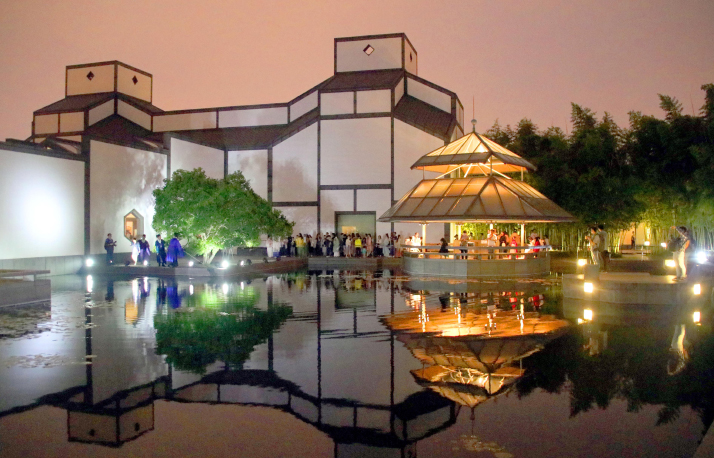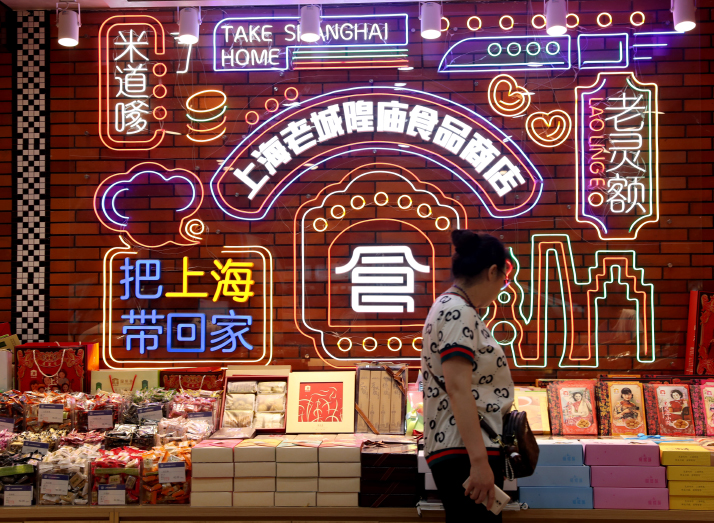| Business |
| Sights by Night | |
| A growing after-dark economy whets urban consumption | |
|
|
 A lit-up Suzhou Museum in east China's Jiangsu Province holds a night program on May 18 (XINHUA)
It's midnight but walking through Guijie Street, a popular night destination in downtown Beijing, you would think it's a carnival evening. Lines of people pop in and out of the row of restaurants, and the mouth-watering smell of spicy crawfish wafting out stops passersby in their tracks and makes them head toward the source of the smell. At Huda Restaurant, a crawfish joint, people are still waiting in queue and connoisseurs say the dish there is worth several hours of waiting. Fang Xuhu, Assistant General Manager at Huda, told Beijing Review that the 24-hour restaurant gets around 5,000 customers daily during the peak seasons, especially in summer. Business is so brisk that it disdains to cater to online orders, on the ground that the fish doesn't taste so great if not eaten right off the frying pan. "People often have to wait for around two hours to enjoy the food. Some of them stay in the restaurant until 2 a.m.," Fang said. While Fang is a service provider during the escalating nightlife in China, Liu Chang is a consumer. After a busy day at the Beijing-based Internet company where she works, the white-collar worker in her 20s rushes to the subway not to go home but to head to the theater. An avid fan of musicals since her school days, Liu likes to watch musicals or rock performances in the evening to unwind. "These artistic performances help me to enjoy myself and forget my troubles. I have seen many impressive shows and made many friends," Liu told Beijing Review. According to her, many of the performances, which run for around two hours, start after 7 p.m. so that people with daytime jobs can attend. Many Chinese urban dwellers are embracing an active nightlife for relaxation and self-improvement, creating new demands, according to Zhao Ping, an official with the China Council for the Promotion of International Trade. Many Chinese cities such as Beijing, Shanghai and Chengdu in Sichuan Province, southwest China have introduced policies to support and promote the nighttime economy evolving out of social, cultural and business activities between 6 p.m. and 6 a.m. such as dining out, shopping and entertainment. The Chinese are showing a growing appetite for nighttime services and according to Zhao, night lights serve as an indicator of a city's nocturnal economic vitality. By developing a nighttime economy, urban consumption can be greatly boosted.  A woman tries to choose local snacks at the Yuyuan Night Market in Shanghai on June 4 (XINHUA)
The young connoisseurs The busy night schedule of delivery people is another indicator of the rising nighttime economic vitality of Chinese cities. A report released by China's e-commerce giant Alibaba on July 24 said over one third of couriers are still on the road at midnight in Shenzhen and Foshan in south China's Guangdong Province and Xiamen in Fujian Province, southeast China. According to another report by the China Tourism Academy (CTA) and online food delivery service provider Meituan Dianping in March, nighttime dining in China rose 47 percent year on year in 2018, 2 percentage points faster than the growth in food consumption during daytime. Beijing ranked first with Shanghai following. Young people have become major contributors to nighttime dining in China. People in their 20s and 30s represented over 88 percent of those who preferred to order food at night, it said. Besides eating out or ordering dinner online, the young also like to watch films or plays at night, with Shanghai, Beijing, Shenzhen and Guangzhou in Guangdong as well as Hangzhou in Zhejiang Province, east China, taking the lead, the report said. Nighttime tours are also booming. According to a report by China UnionPay Merchant Services, nighttime trips for domestic tourists represented 29.92 percent of all tours by Chinese tourists during the May Day holiday this year, rising from 25.82 percent in 2017. According to a survey by the CTA in March, nearly 60 percent of the 657 participating travel agencies expected a 10-20 percent increase in the scale of the night-tour market. More than 80 percent said they were willing to expand their investment in the field. However, according to the survey, the total revenue of nighttime tours represented less than 30 percent in 79.24 percent of the surveyed travel enterprises, suggesting there was much room for growth, both in volume and quality. Nighttime travel that can boost consumption in catering, retail and cultural industries remains a blue ocean to be explored, Li Jun, a researcher with the Chinese Academy of International Trade and Economic Cooperation, said. The increasing demand for a meaningful and entertaining nightlife has become an important driving force of cultural programs such as operas, musicals and museum tours. According to Zou Tongqian, Deputy Director of the Experts Committee of the World Tourism Cities Federation, China's nighttime economy is no longer restricted to simple night markets, having become increasingly diversified. Exhibitions, art galleries and gymnasiums are being increasingly frequented at night. Museums such as the Palace Museum in Beijing and the Suzhou Museum in Jiangsu Province, east China, are now staying open late for visitors to enjoy nighttime cultural activities like laser shows. Many cities have 24-hour bookstores. Zou said developing the nighttime economy will offer more diverse options for nighttime activities. "It will also help make the most of facilities, enhance employment and promote cultural industries," he told Beijing Review. How cities are contributing Liu Zhe, Vice President of Beijing-based economic think tank Wanb Institute, told Securities Daily the nighttime economy already accounts for a large proportion of the revenue of some industries in first-tier cities such as Beijing and Shanghai. Some second- and third-tier cities are also showing great potential. Many cities are taking a hand in advancing their nighttime economy. In April, Shanghai issued a guideline announcing that nightlife activity areas would be built, including parking spaces and waiting zones for taxis and late-night bus services. It also relaxed the business hours for cinemas, music clubs and live houses. Chongqing in southwest China, famous for its local food, is planning more diverse nightlife attractions, including inviting street artists from around the world to perform at a major nightlife venue. Beijing recently announced it would improve its public transport services at night and extend the business hours of restaurants, malls and convenience stores. To many people like Liu Chang, the subway offers a convenient and quick mode of nighttime transport. On July 19, the capital extended the running hours of two subway lines on Fridays and Saturdays with the last train departing after midnight, further facilitating transportation of people going out to enjoy nightlife. However, many inland northern regions are still lagging in developing their nighttime economy as nightlife activities have a longer history in south and east China, Zou said. Their warm climate has made many southern areas in China a natural cradle of the nighttime economy. Nine out of the top 10 cities in nighttime consumption are in south China while Beijing is the only northern city, according to the Alibaba report. Zou suggested that northern cities start by increasing the hours of public facilities and introducing the local people gradually to an after-dark consumption lifestyle. Hurdles to overcome As nightlife demands rise, "rising lighting and transportation costs as well as ensuring people's safety are the major issues to be addressed," Zou said. Homogeneous development is also a problem. Zou said Chinese cities need to develop nightlife zones with distinctive local features, such as waterside zones and historical sites. Liu Xuezhi, a senior researcher with the Bank of Communications, told Economic Daily that more measures are needed to cope with environmental problems such as cleaning garbage and reducing noise, which requires that residential and nightlife areas be appropriately laid out. However, the final purpose of the nighttime economy has to be to serve more goals beyond economic growth. Zou said China should develop its nighttime economy with the ultimate aim of boosting Chinese culture. Many countries such as the UK and the Netherlands have been doing so and China should follow suit, he said. Copyedited by Sudeshna Sarkar Comments to lixiaoyang@bjreview.com |
|
||||||||||||||||||||||||||||||
|